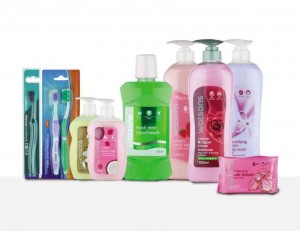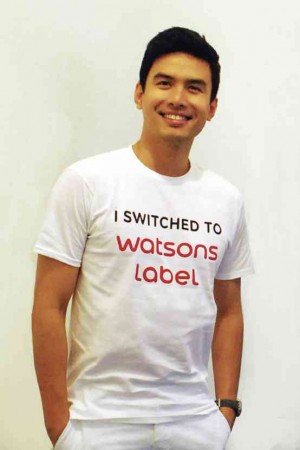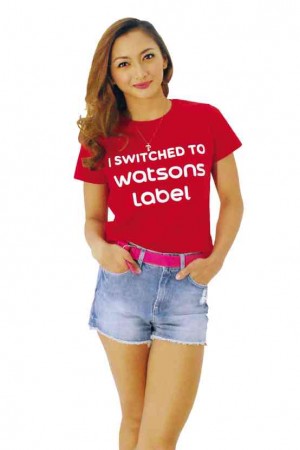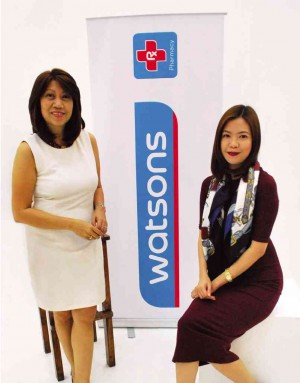Private labels pose big challenge to top brands
MANILA, Philippines–Once considered lowly and only for those on a tight budget, the store brand, also known as the private label, has become widely accepted in the West.
It is also winning the loyalty of consumers in Asia, with companies such as Watsons, one of Asia’s largest health and beauty retailers, raising the profile of the store brand.
Switch and Save
Watsons has, for instance, embarked on a Switch and Save campaign to make it known that its Watson Label offers better value for money since its wide range of products are 30 to 80 percent cheaper than their branded counterparts.
“We’ve introduced new products with variants. For instance, the hand soap segment has antibacterial and moisturizing [variants]. Our shampoos are treatment-oriented. Consumers then are educated on the variants’ functions,” says Victoria Encarnacion, marketing director for Watsons Personal Care.
Article continues after this advertisementThe shower creams, on the other hand, come in fruit scents and boast of whitening and detoxifying properties. Watsons also carries the triple-action and charcoal toothbrush, which has finer bristles that are gentle on sensitive gums, adds Karen Fabres, Watsons senior marketing manager.
Article continues after this advertisementAdding to the popular personal care lineup are the non-alcohol and plant-based herbal mouthwash.
The Watsons executives acknowledge that there is a perception that store brands are of inferior quality.
To change this, Watsons is investing heavily in improving product features, expanding the product range, intensifying promotions and tapping celebrity endorsers.
Endorsers
Singer Christian Bautista is the newest spokesperson and he was chosen not only for his popularity but also for his smart shopping habits.
“He doesn’t always go for the expensive stuff because he looks at value for money,” says Fabres.
Bautista uses Watsons charcoal toothbrush and he loves the fresh taste of the mint mouthwash.
“Most men tend to think that a personal care line is for women only. It’s not entirely true. As a guy, I try to tell other guys that there are Watsons products for men, too,” he says.
Watsons’ Switch and Save campaign was born out of focus discussion groups in 2012.
Loyal customers were asked why they patronized the Watsons Label and the top response was value for money.
Although the products were cheaper, consumers said they were just as good as the leading brands. They substituted to Watsons so they could save money.
“The idea of the campaign came from our consumers. With their savings, they could buy the things that they’ve been dreaming of like travel, gadgets, dates or a bag,” explains Encarnacion. “They don’t have to spend big on toiletries so they can spend big on life.”
Watsons’ two-piece toothbrush set costs P59 while the leading brand charges P89. The dental floss is P39 while that of an established brand costs P199.
The Watsons cream shampoo is P115 while a top brand is priced at P259.
In the Watsons generic medicine category, antihistamines cost P2 to P9 while the branded counterparts cost P25 to P45.
First campaign
Switch and Save was Watsons’ first campaign that used celebrity endorsers like Tessa Prieto-Valdes, Divine Lee, Victor Basa and Patty Laurel.
Iya Villania, who is in her second year as Watsons ambassador, has been endorsing Watsons products to the million followers of her social media accounts.
To ensure quality standards of Watsons products, production is centralized in China and Hong Kong.
“The quality assurance director makes sure that the standards we are committing to customers are unquestionable. The products undergo a stringent manufacturing process that is at par with market leaders,” says Encarnacion.
Quality assurance
Fabres adds, “Our own brands go through 5-Step Quality Assurance Process, from manufacturing to distribution. Product development and testing take at least 18 months to ensure that the product is of the best quality.”
Encarnacion hopes that one day soon, Watsons will penetrate every household in the Philippines.
“My dream is to see a cabinet with at least one product, whether it’s a toothbrush, toothpaste, hand soap or shampoo, with the Watsons Label,” Encarnacion says.
It’s a long way off though.
An article in The New York Times quoted a survey that said 96 percent of respondents had purchased a store brand and that private-label sales were growing annually by 18 percent.
Store-brand awareness in Asia, however, has yet to increase.

Watsons has brought to the market products that are 30 to 80 percent cheaper than their branded counterparts.
“Sales of private labels are as high as 40 percent in Europe. Unlike in Asia, it’s 5 percent. The Asian market is just starting to be discerning about their product choices. That’s why we are working hard to develop new products,” says Fabres.
In America, the popularity of store brands was driven by the economic slump that forced consumers to be more thrifty.
The US economy has recovered, but sales of store brands have remained buoyant as companies improved their product development and consumers remained budget conscious.
“Consumers abroad study the content label and make comparisons. Here, Filipinos will buy something when it’s advertised. If they see it on TV, they think it’s a good product. It’s going to take a while to educate them,” says Encarnacion.


